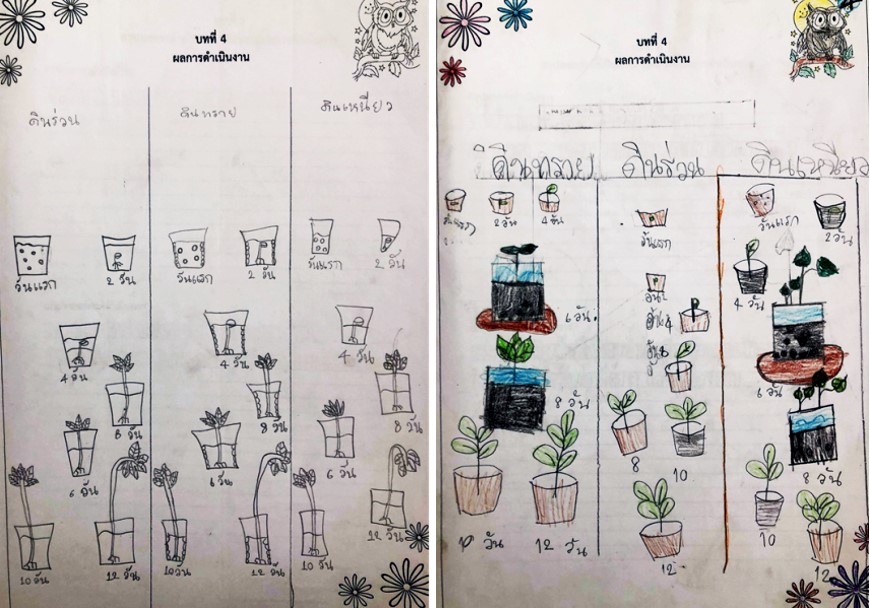การพัฒนาทักษะกระบวนการทางวิทยาศาสตร์ด้วยการสอนโดยใช้วิจัยเป็นฐาน เรื่อง สมบัติของดิน สำหรับนักเรียนชั้นประถมศึกษาปีที่ 2 โรงเรียนเทศบาลแห่งหนึ่งในจังหวัดสุราษฎร์ธานี
Main Article Content
Abstract
Bannarak Khumraksa and Petladda Ruksakit
รับบทความ: 21 เมษายน 2561; แก้ไขบทความ: 3 ธันวาคม 2562; ยอมรับตีพิมพ์: 10 มกราคม 2562
บทคัดย่อ
ทักษะกระบวนการทางวิทยาศาสตร์เป็นทักษะที่จำเป็นสำหรับการเรียนวิชาวิทยาศาสตร์ในทุกระดับชั้น งานวิจัยนี้จึงมีวัตถุประสงค์เพื่อพัฒนาทักษะกระบวนการทางวิทยาศาสตร์ของนักเรียนด้วยการสอนแบบใช้วิจัยเป็นฐาน กลุ่มตัวอย่างที่ใช้ในการวิจัย ได้แก่ นักเรียนชั้นประถมศึกษาปีที่ 2 ของโรงเรียนเทศบาลแห่งหนึ่งในจังหวัดสุราษฎร์ธานี จำนวน 30 คน ที่ได้จากการสุ่มตัวอย่างแบบกลุ่ม ผู้วิจัยได้ออกแบบแผนการจัดการเรียนรู้วิชาวิทยาศาสตร์ เรื่อง สมบัติของดิน โดยใช้การสอนแบบวิจัยเป็นฐาน จำนวน 1 แผน เพื่อใช้เป็นนวัตกรรมในการพัฒนานักเรียน เก็บข้อมูลทักษะกระบวนการทางวิทยาศาสตร์ของนักเรียนในระหว่างที่นักเรียนปฏิบัติกิจกรรมในชั้นเรียนโดยใช้แบบประเมินทักษะกระบวนการทางวิทยาศาสตร์ที่ถูกสร้างขึ้นสำหรับการวิจัยนี้ วิเคราะห์ข้อมูลเชิงปริมาณจากแบบสอบถามและแบบทดสอบ และวิเคราะห์ข้อมูลเชิงคุณภาพจากชิ้นงาน หลักฐาน และร่องรอยการเรียนรู้ของนักเรียน และนำเสนอผลการวิเคราะห์ข้อมูลในรูปแบบการบรรยายเชิงพรรณนา ผลการวิจัยพบว่านักเรียนกลุ่มตัวอย่างที่ได้รับการจัดกิจกรรมการเรียนรู้แบบใช้วิจัยเป็นฐานแสดงพฤติกรรมที่น่าพอใจ ซึ่งบ่งชี้ถึงการมีทักษะกระบวนการทางวิทยาศาสตร์ที่อยู่ในระดับดี นอกจากนี้นักเรียนกลุ่มตัวอย่างยังมีผลการเรียนรู้ด้านเนื้อหาวิชาในระดับดีด้วย
คำสำคัญ: ทักษะกระบวนการทางวิทยาศาสตร์ วิธีการสอนแบบวิจัยเป็นฐาน สมบัติของดิน วิชาวิทยาศาสตร์ ชั้นประถมศึกษา
Abstract
The science process skills are important skills for each level of science learning. This research aimed to improve science process skills of the students by using research–based instruction (RBI). Research sample are thirty 2nd grade students in a Municipal School from Surat Thani, sampled by cluster sampling. A science lesson plan in the topic of “soil properties” was developed to apply as an instrument for student learning improvement. The data of students’ science process skills were collected when students were doing the class activities. The quantitative data was analysed from questionnaire and examination. The qualitative analysis was evaluated from questionnaire, work assignments and evidence–based assessment, carried out descriptive analysis. The result showed that the student sample treated with research–based instructional method performed a satisfied behavior involving scientific process skills as good level. In addition, student’s content knowledge was also found as good level.
Keywords: Science process skill, Research–based instruction, Soil properties, Science, Primary level
Downloads
Article Details

This work is licensed under a Creative Commons Attribution-NonCommercial 4.0 International License.
References
American Association for the Advancement of Science (AAAS). (1976). Science – A Process Approach. Washington, DC: Author.
Bell, S. (2010). Project–Based Learning for the 21st Century: Skills for the Future. The Clearing House: A Journal of Educational Strategies 83(2): 39–43.
Buasri, O., and Khumraksa B. (2018) Enhancing of scientific process skills for the 4th grade students, Wat Kanjanaram School, using research–Based learning. Journal of Physics and General Science 2(1): 165–177.
Bybee, R. W., Taylor, J. A., Gardner, A., Scotter, P. V., Powell, J. C., Westbrook, A., Landes, N., et al. (2006). The BSCS 5E Instructional Model: Origin and Effectiveness. Colorado: BSCS.
Chaidech, T., Chanunan, S., and Chaiyasit, W. C. (2017). Development of collaborative problem solving competency using research–based learning according to STEM education in fossil fuels and products. Journal of Re-search Unit on Science, Technology and Environment for Learning 8(1): 51–66. (in Thai)
Charoenrat, J., and Nillapun, M. (2014). The development of analytical thinking ability and science process skills for ninth grade students taught by project approach. Silpakorn Educational Research Journal 6(2): 182–194. (in Thai)
Department of Curriculum and Instruction Development. (2012). Student–Centered Instructional Strategies. Bangkok: Religious Printing House. (in Thai)
Faikhamta, C. (2016). PSMT Pre–service science teachers’ understandings of nature of sci-ence. Journal of Education Prince of Songkla University 27(2): 21–37. (in Thai)
Firmage, D. H., Tietenberg, T. H., and Cole, F. R. (2005). Research–based learning in an introductory environmental studies course. Council on Undergraduate Research Quarterly 23(4): 191–200.
Hungsanate, T. (2015). The design of practical skills package for scientific equipment and tools for upper secondary students. Journal of Research Unit on Science, Technology and Environment for Learning 6(1): 84–94. (in Thai)
Kaen–In, A., Chudopama, M., and Kanchana-garun, P. (2012). Development of learning package to enhance the fundamental scientific process skills for Prathomsuksa VI students. Journal of Buriram Rajabhat University 4(2): 56–71. (in Thai)
Kelley, T. R., and Knowles, J. G. (2016). A conceptual framework for integrated STEM education. International Journal of STEM Education 3(11): 2–11.
Khamdit, S. (2014). Research–based learning (RBL) in higher education. Suthiparithat 28(85): 9–21. (in Thai)
McLelland, C. V. (2006). Nature of Science and the Scientific Method. Colorado: The Geological Society of America.
Ministry of Education, Thailand. (2008). Basic Education Core Curriculum B.E. 2551. Bangkok: Author.
Panawong, S., Insombat, B., Yimchang, A., (2015). Competency development of research teachers to promote cultural tourism of upper Chao Phraya River community for Nakhon Sawan Rajabhat University student teachers. Social Sciences Research and Academic Journal 10(29): 1– 16. (in Thai)
Phornphisutthimas, S. (2008). Teaching sciences using science process skills. Advanced Science Journal 8(2): 28–38. (in Thai)
Porntrai, S., and Wattarach, J. (2014). The effects of research–based learning on grade–11 students’ desirable characteristic changing in Pohpanpunya project. Journal of Research Unit on Science, Technology and Environment for Learning 5(2): 176–185. (in Thai)
Prasertsan, S. (2012). Research–Based Learning: A New Learning Paradigm in Education of Thailand. Bangkok: The Thailand Research Fund (TRF). (in Thai)
Prince, M. (2004). Does active learning work? A review of the research. Journal of Engineering Education 93(3): 223–231.
Tomasik, J. H., Cottone, K. E., Heethuis, M. T., and Mueller, A. (2013). Development and preliminary impacts of the implementation of an authentic research–based experiment in general chemistry. Journal of Chemistry Education 90: 1155–1161.
Tomasik, J. H., LeCaptain, D., Murphy, S., Martin, M., Knight, R. M., Harke, M. A., Burke, R., Beck, K., and Acevedo–Pola kovich, I. D. (2014). Island explorations: discovering effects of environmental research–based lab activities on analyticcal chemistry students. Journal of Chemistry Education 91: 1887–1894.
Turner, R. C., and Carlson, L. (2003). Indexes of item–objective congruence for multidimensional items. International Journal of Testing 3(2): 163–171.
Winkelmann, K., Baloga, M., Anquandah, G., Cohen, P., Giannoulis, C., and Marcinkowski, T. (2015). Improving students’ inquiry skills and self–efficacy through research–inspired modules in the general chemistry laboratory. Journal of Chemistry Education 92: 247–255.
Wuttiprom, S., Wuttisela, K., and Chitaree, R. (2016). Factors affecting the success of research–based learning used by enrichment science classroom teachers in the lower part of north–eastern Thailand. Journal of Research Unit on Science, Technology and Environment for Learning 7(2): 350–362. (in Thai)
Yew, E. H. J., and Goh, K. (2016). Problem–based learning: An overview of its process and impact on learning. Health Professions Education 2: 75–79.
